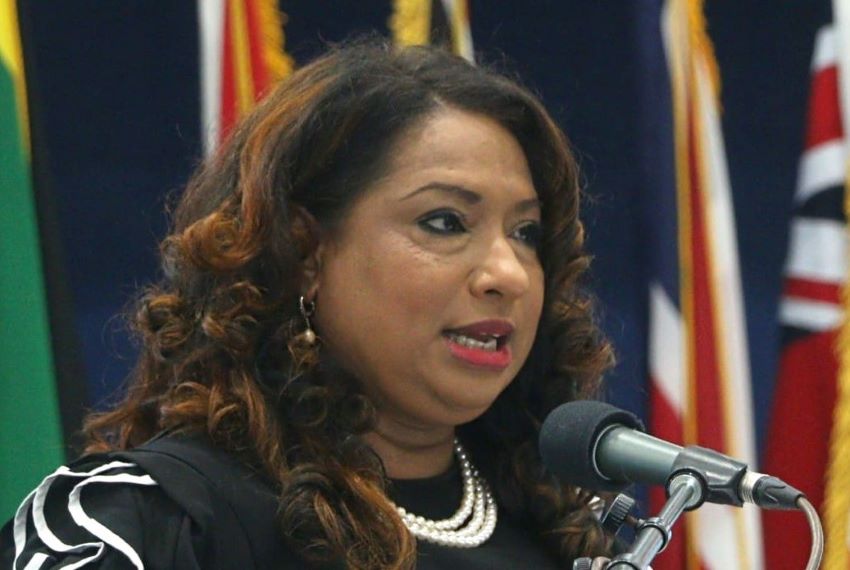One in four adults in the Caribbean has a diagnosable mental health condition. But, 60 per cent of those affected never receive treatment.
This was the concerning picture painted by the statistics shared by Executive Director of the Caribbean Public Health Agency (CARPHA), Dr. Lisa Indar, at the opening ceremony for its 69th Annual Health Research Conference at the Lloyd Erskine Sandiford Centre yesterday. The conference, which has approximately 400 attendees, runs from May 7 to 9.
The treatment gap in some islands exceeded 90 per cent, she noted, which translated to nine out of every 10 people not receiving treatment.
Dr. Indar went on to reveal that depression and anxiety disorders accounted for 50 per cent of mental health conditions, and while suicide rates varied significantly between countries, they were showing concerning upward trends, particularly among the youth.
The CARPHA Executive Director pointed out that emerging data showed a “troubling” trend where Caribbean adolescents experience rates of depression, which were approximately 15 per cent higher than the global average. Contributing factors included academic pressure, exposure to violence, and limited youth-focused mental health resources.
“These statistics are not merely numbers – they represent our neighbours, family members, colleagues, and increasingly, our children. Each untreated case represents a story of unnecessary suffering and unrealised potential. Over 70 per cent of people in our region who need mental health care do not receive it. That is not just a service gap, it is a silence we must break.
Dr. Indar went on to reveal that depression and anxiety disorders accounted for 50 per cent of mental health conditions, and while suicide rates varied significantly between countries, they were showing concerning upward trends, particularly among the youth.
“That gap exists because of stigma, because of scarce resources, and because our systems have not always been designed with early intervention or community care in mind. Let us not mistake resilience for resignation. True strength comes not from pretending we are fine but from being willing to say, ‘I need help’,” Dr. Indar stated.
She further noted specific challenges faced by the region that can sometimes weigh on one’s mental health – the effects of hurricanes, economic pressures, and climate change.
Despite this, she said, mental health only receives four per cent of health care budgets across much of the region.
Dr. Indar called on researchers and public health leaders to close critical knowledge gaps when it came to mental health, through robust epidemiological data specific to Caribbean populations; and implementation research examining how to adapt evidence-based interventions to resource constraints and cultural contexts.
She said they should also advocate for funding for economic analyses that quantify the return on investment in mental health promotion; and adopt participatory research methodologies that prioritise the perspectives of individuals who have lived experience with mental health challenges.
The Executive Director pointed out that this involved collaboration between ministries of health, education, social development, and finance, as well as among researchers, practitioners, policymakers, and communities.
She stressed that it was crucial that countries in the region exchange resources and knowledge, and that there be collaboration between international organisations and local institutions.
Dr. Indar added that the Caribbean Public Health Agency was committed to supporting initiatives that build these partnerships, such as technical cooperation, knowledge exchange, and resource mobilisation efforts. Additionally, she encouraged researchers attending the conference to continue to conduct relevant research to promote health in the region.
The conference also features sessions on non-communicable diseases, family health, infectious diseases and nutrition. The next CARPHA Health Research Conference will be held in Guyana in April 2026 with the theme “Innovations in Health”. (PR/GIS)

 Local1 week ago
Local1 week ago
 International3 weeks ago
International3 weeks ago
 Business3 weeks ago
Business3 weeks ago
 Tourism2 weeks ago
Tourism2 weeks ago
 Sports1 week ago
Sports1 week ago
 Government2 weeks ago
Government2 weeks ago
 Local3 weeks ago
Local3 weeks ago
 Government4 weeks ago
Government4 weeks ago






















